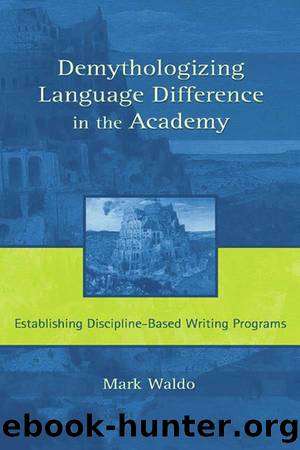Demythologizing Language Difference in the Academy by Waldo Mark;

Author:Waldo, Mark;
Language: eng
Format: epub
ISBN: 335496
Publisher: Taylor & Francis Group
6
Workshops for Designing Assignments and Grading Writing Across the Curriculum: A Difference-Based Approach
How could English departments and the compositionists within them have developed such an edge of superiority about the teaching of writing; and why, when that superiority is challenged by a WAC process that gives responsibility for teaching writing to the disciplines, could English become vindictive and hostile?
For an explanation, I turn to Karen Horney (1970), therapist and researcher into the neurotic condition, whose chapter âNeurotic Prideâ is particularly applicable. I have changed Horneyâs referents from the neurotic, the person, he, his, and himself to the English department, English, it, its, and itself. Given that (and the fact that I am not taking myself too seriously), here is the Third Force explanation of the phenomenon:
Even though god-like in [its] imagination, [the English department] still lacks the earthy self-confidence of the simple shepherd⦠. [English] still feels at bottom unwanted, is easily hurt, and needs incessant confirmation of its value. (p. 86)
Neurotic pride ⦠rests on the attributes which [English] arrogates to itself in [its] imagination, on all those belonging to [its] particular idealized image. Here the peculiar nature of neurotic pride comes into clear relief. [English] is not proud of [the department it] actually is. Knowing [its] wrong perspective on [itself], we are not surprised that [its] pride blots out difficulties and limitations. (p. 90)
The idealized image is a product of [Englishâs] imagination. But this is not something which is created overnight. Incessant work of intellect and imagination, most of it unconscious, goes into maintaining the private fictitious world ⦠through finding ways to make things appear different from what they are. (p. 91)
In terms of subjective experience [neurotic pride] makes [English] vulnerable, and does so exactly to the extent that [it] is obsessed by pride. It can be hurt as easily from within as from without. The two typical reactions to hurt pride are shame and humiliation. [English] will feel ashamed if [it does, thinks, or feels] something that violates [its] pride. And [English] will feel humiliated if others do something that hurts [its] pride, or fail[s] to do what [its] pride requires of them. (p. 95)
That any hurt to [Englishâs] pride may provoke vindictive hostility is well known. It goes all the way from dislike to hate, from irritability to anger to a blind murderous rageâ¦. What operates here is the straight law of retaliation. (p. 99)
Download
This site does not store any files on its server. We only index and link to content provided by other sites. Please contact the content providers to delete copyright contents if any and email us, we'll remove relevant links or contents immediately.
Phoenicians among Others: Why Migrants Mattered in the Ancient Mediterranean by Denise Demetriou(595)
american english file 1 student book 3rd edition by Unknown(586)
Verus Israel: Study of the Relations Between Christians and Jews in the Roman Empire, AD 135-425 by Marcel Simon(584)
Caesar Rules: The Emperor in the Changing Roman World (c. 50 BC â AD 565) by Olivier Hekster(568)
Basic japanese A grammar and workbook by Unknown(552)
Europe, Strategy and Armed Forces by Sven Biscop Jo Coelmont(511)
Give Me Liberty, Seventh Edition by Foner Eric & DuVal Kathleen & McGirr Lisa(491)
Banned in the U.S.A. : A Reference Guide to Book Censorship in Schools and Public Libraries by Herbert N. Foerstel(479)
The Roman World 44 BC-AD 180 by Martin Goodman(469)
Reading Colonial Japan by Mason Michele;Lee Helen;(462)
DS001-THE MAN OF BRONZE by J.R.A(458)
The Dangerous Life and Ideas of Diogenes the Cynic by Jean-Manuel Roubineau(449)
Introducing Christian Ethics by Samuel Wells and Ben Quash with Rebekah Eklund(446)
Imperial Rome AD 193 - 284 by Ando Clifford(444)
The Oxford History of World War II by Richard Overy(444)
Catiline by Henrik Ibsen--Delphi Classics (Illustrated) by Henrik Ibsen(412)
Literary Mathematics by Michael Gavin;(406)
Language Hacking Mandarin by Benny Lewis & Dr. Licheng Gu(399)
Brand by Henrik Ibsen--Delphi Classics (Illustrated) by Henrik Ibsen(376)
